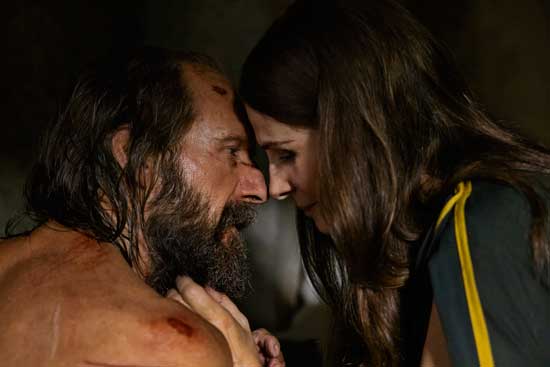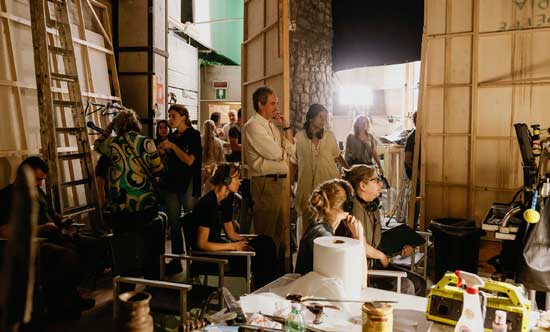Ruwanthi returns to cinema with Italian director Pasolini
Playwright Ruwanthie de Chickera who worked with Italian film director Uberto Pasolini on the acclaimed film Machan (2008) has collaborated with Pasolini once again on the script of his new film ‘The Return’ – a retelling of Homer’s Odyssey. The Return stars Ralph Fiennes as Odysseus and Juliette Binoche as Penelope, the two reuniting after The English Patient (1996) almost 30 years ago.
The Return was released in UK, Australian and Irish cinemas on April 11. Ruwanthie flew to London to be present at the preview of the film held at the British Museum on April 9 where Fiennes and Pasolini sat down for a Q&A.

Ralph Fiennes and Juliette Binoche in The Return
Machan which won several international awards including Best Film at the Venice Film Festival was Ruwanthie’s first commissioning to write a film script. Working with Pasolini once again after 15 years, she is listed in The Return’s credits for Script Collaboration.
One of Sri Lanka’s leading playwrights, with 35 original plays and two screenplays to her credit, Ruwanthie is artistic director of the Stages Theatre Group and serves on the Executive Committee of the Arts Council of Sri Lanka and the Freedom of Expression Sub-committee of the Human Rights Commission of Sri Lanka.
Here are extracts from her Q&A with Yomal Senerath-Yapa about her experiences working on The Return:
- Turning one of the best-known epics in the world into a film script must have been somewhat daunting. How did you set about it?
“People love stories” is a line that Odysseus says in the film, when he sits, unrecognized, amongst his own countrymen who exchange tales about the great victories of Troy they have heard.
I have come to believe this to be one of the truisms of life.
Stories that have stood the test of time, that can be retold, returned to, are timeless in their fundamental simplicity and truth. If you can connect with that truth, if it still excites you as a writer, there is no need to be intimidated by how old a story is or how well it is known. Like any and all the writers before you, you have to own it, wrestle with it, submit to it before you release it, now as yours.
When Uberto first asked me to collaborate with him on the final draft of the script I responded primarily to his belief in the characters. He was in love with them, obsessed by them, this drew me in.
Also, Uberto was never interested in telling the whole story of the Odyssey. The film always set out to focus only on the final bit, when Odysseus, after 10 years of war and 10 years of travelling, returns to Ithaca, which by then is overrun by suitors to his wife Penelope. This is the start of our film – a naked, almost-dead man being washed ashore in an island after a shipwreck.
It really is the best bit of the story, where all these enormous characters that Homer dreamed up, face their reckoning.
What was daunting (because it is something that I had never done before) was working on a script that had been in the making for 20 years, already worked on by well-established writers. Trying to work out what needed to remain, what needed to be changed, restructured etc… was both interesting and challenging. Uberto made it easy by giving himself and me a lot of freedom with the existing script.
- What was exciting about the whole experience- working for a major international production?
The scale of it was exciting. And this I got to see only when I actually went on set in Italy. I was delighted because I was able to time my visit with the scenes I was most interested in watching – the fight scene and the love scene.
Of course, I state the obvious when I say it was illuminating to observe seasoned artists such as Fiennes and Binoche approach their roles. I was deeply impressed by how hard these world-famous actors worked on set, how seriously they took their roles. Nothing was taken for granted, everything was planned and worked on and perfected.
I come from the theatre and I am used to a different rhythm and skill set in acting. The capacity of experienced screen-actors to keep consistently hitting emotional and physical peaks again and again and again until the director says CUT really fascinated me. It made me understand why they have risen to the top of their game.

Ruwanthie de Chickera on the set of the film. Pix by Fabio Zayed and Maila Iacovelli
- To compensate for the lack of ‘monsters, sirens and Cyclops’ what elements did you introduce?
In our film the characters don’t get to offload decisions onto any gods, spirits or nymphs. There is no supernatural entity controlling them, rewarding them or obstructing them. They take ownership of everything they do. Odysseus decides to hide his identity from his wife Penelope; he decides to kill the suitors, Penelope decides to stay faithful to her husband even when this endangers the life of her son Telemachus. And like for any of us, these decisions carry consequences.
So in answer to your question about compensation; we compensated the supernatural with nothing more flashy than reality – a complex human situation, navigated by imperfect people, weighed down by guilt, jealousy, doubt, anger, betrayal, desire… all the components you need for a great story.
- What challenges did you encounter in the process of writing/ finishing the script?
Uberto and I started working on the final draft of the script remotely during COVID. I immediately read everything I could on the Odyssey. I had studied it in school many years back but needed to refresh my memory. We later met physically in London to complete the task.
Unlike with the script of Machan, which was worked on until we felt it was finished, this script had a deadline, as pre-production on the film had already started. Further because it was a big show with many big players, the script had to be sent out periodically for approval, for feedback, sometimes to secure yet another collaborator. I found this a bit challenging.
Also the late Edward Bond who was responsible for one of the first drafts of the script, had set in place a very distinct ‘voice’ for the characters’ to speak in. It was very lean. Uberto was also adamant that all aspects of the film – the visual, the story, the costumes etc… would remain simple, clean. So squeezing huge emotions, like those that Odysseus and Penelope would experience, into these very simple, lean lines was a task. It felt, often, like we were writing poetry.
- The film was released on April 11th. How has the response been so far?
Countries have had varying responses. Italian and Greek audiences have embraced the film, USA has been varied, the response in the UK has been good. It seems that, in general, it is being appreciated for its cleanness, its restraint, its understatement. This is important to both Uberto and myself.
The film has also drawn crowds because of the reuniting of Fiennes and Binoche on screen, almost 30 years after we saw their tender chemistry in The English Patient. Writing lines for this reunion was a definite bonus for me as a writer.
The Return has also been appreciated for its refusal to glorify war, which is personally very important to me, especially at a time when the veneration and whitewashing of atrocities is happening on a scale the world has not experienced before. The destruction of Troy is ‘justified’, and Odysseus admits that Troy and its people had to be destroyed because neither could be conquered.
I valued the chance to examine and imagine the impact of long-drawn out violence on a venerated war hero. Odysseus is a battle-hardened soldier, a war machine; but he is deeply, utterly broken, haunted by the very violence he has lived by.
Searching for an ideal partner? Find your soul mate on Hitad.lk, Sri Lanka's favourite marriage proposals page. With Hitad.lk matrimonial advertisements you have access to thousands of ads from potential suitors who are looking for someone just like you.


